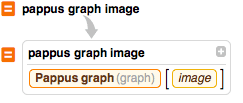Discrete Mathematics
Perform basic number theory operations such as factoring:
| In[1]:= |
| Out[1]= |
Find the GCD (or LCM) of any two integers:
| In[2]:= |
| Out[2]= |
Display the 4th prime number:
| In[1]:= |
| Out[1]= |
Test the primality of a number:
| In[2]:= |
| Out[2]= |
This works with coprime numbers as well:
| In[3]:= |
| Out[3]= |
Get all possible permutations of a list:
| In[1]:= |
| Out[1]= |
Apply Permute to a list using disjoint Cycles:
(Cycles takes a list of lists as an argument.)| In[2]:= |
| Out[2]= |
Find the permutation order:
| In[3]:= |
| Out[3]= |
Generate a Graph from a list of edges:
(Use ESCueESC for an UndirectedEdge or ESCdeESC for a DirectedEdge.)| In[1]:= |
| Out[1]= |  |
Find the shortest path between two vertices:
| In[2]:= |
| Out[2]= |
Explore well-known graphs using natural-language input:
| In[3]:= |
| Out[3]= |  |
The Wolfram Language also includes functions for combinatorics, probability, integer sequences and much more.
QUICK REFERENCE: Number Theoretic Functions »
QUICK REFERENCE: Discrete Mathematics »

